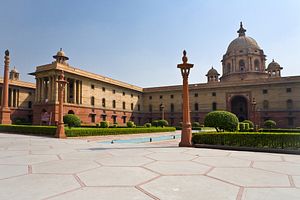We want all corrupt to be jailed and get severe most punishment.
– Arvind Kejriwal, activist-turned Chief Minister of Delhi
This statement echoes both the explicit and unexpressed desire and anguish of the common man in India. Although corruption extends to political, bureaucratic, corporate and other aspects of national life, cleansing the polity, the authoritative wielder of national destiny, is imperative. In fact, the magnitude of political corruption and the prevailing VIP culture that surrounds politics underscore the charm that public office holds for unscrupulous individuals. Moreover, indulging in corrupt practices is close to being a risk-free exercise. The loopholes in anti-corruption laws, overburdened judiciaries, vicious camaraderie among top to bottom officers and their nexuses with political bosses – all create a fertile ground for corruption. It is thus vital to rid Indian politics of the lure that tempts and places vampires feeding themselves at the cost of public exchequer.
Pays, Perks and Profligacy
In 2010, the members of Parliament (MPs) hiked their own salaries and allowances in a legislative amendment, unmoved by the contrasting grim plight of the common man. As a consequence, their monthly salary is Rs. 50,000 ($813), while monthly office and constituency allowances are Rs. 40,000 each. Members are also entitled to a daily allowance of Rs. 2,000 for each day of residence at a place where a parliamentary session is being held – a reward for attendance. But the story doesn’t end here. Their yearly amenities include 50,000 units of free electricity, 4,000 kiloliters of free water, three phone lines and 50,000 free local phone calls per line, and one free first-class air-conditioned or executive class train pass, in addition to access to medical facilities. MPs also benefit from such amenities as washing of sofa covers and curtains and an entitlement to furniture worth Rs.60,000 in respect of durable furniture and Rs.15,000 for non-durable furniture. According to the Citizen’s Report on Governance and Development, 2013, authored by National Social Watch, in terms of absolute amount, the value of Indian MP’s pays and perks is 68 times higher than the nation’s per capita income, and is also higher than that of their counterparts in Singapore, Japan and Italy. Members of state legislative assemblies enjoy more or less similar comforts.
Meanwhile, as they enjoy their luxurious lifestyles, legislative members are reluctant to work. Revealing their abominable level of productivity, the National Social Watch Report states: “In 2010-12, Lok Sabha [House of the People] worked an average of less than four hours per day during 227 sittings in 852 hours…. The Rajya Sabha [Council of States] worked for 744 hours in 228 sittings. It functioned for three hours per day in each sitting instead of scheduled five hours, causing loss of about 442 hours in interruptions and forced adjournments.”
Consider the travel expenses of political elites. Between 2007 and 2012, Pratibha Patil, then president of India, a ceremonial post, spent Rs. 2.23 billion ($36.2 million) on overseas travel. No worthwhile national cause was served. Prime Minister Manmohan Singh is perhaps less well known for his fondness for foreign travel. Yet since Singh’s assumption of office in 2004, Rs. 6.42 billion have been incurred on his 67 trips abroad, again with dubious benefits for India. The travel expenses of other political elites such as central ministers meanwhile surged from Rs. 0.56 billion in 2010-11 to Rs. 6.78 billion in 2011-12.
Media Vigilance and Public Activism
The recently passed Lokpal and Lokayuktas Bill, 2013, aimed at creating anti-corruption watchdogs at the national and state levels, is expected to take on corruption. In fact, more reforms such as judicial streamlining and an electorate right to recall have been proposed from time to time. The key thing is that the reforms to check both corruption and profligacy need to be catalyzed by the trio of media, public and activists, as evidenced by the political triumph of anti-corruption movement (which evolved into the Aam Admi Party-AAP) in Delhi. AAP leader and Delhi Chief Minister Arvind Kejriwal’s publicized statement that he is an Aam Admi or common man and his refusal to use escort vehicles have created media headlines, prompting political leaders in several other states to announce more or less similar measures. For example, Uttar Pradesh CM Akhilesh Yadav has decided to reduce the number of cars in his convoy. Rajasthan CM Vasundhara Raje, known for her “upscale lifestyle,” has halved her security details, decided to stop at red lights as do “common commuters,” and has chosen to reside in a small government residence rather than a luxurious bungalow. Though these are piecemeal measures, what is striking is that these governments and the parties they represent have become apprehensive of public fury. A somewhat similar example can be seen in China, where one of the purposes of the central leadership’s anti-graft campaigns is to assuage smoldering public anger over corruption-bred inequality while stifling the public interest in governance that can possibly be aroused by a temptation to share in the national treasure.
Of course, there are non-corrupt leaders who lead simple lifestyles in India such as West Bengal CM Mamata Banerjee and Tripura CM Manik Sarkar (known for “legendary honesty”), but they constitute a tiny percentage of the nation’s political class. Moreover, they are too humble to publicize their distinctiveness. Consequently, their clean record has failed to exert moral pressure on their thick-skinned counterparts. As such, public pressure, media vigilance, and determined activism appear essential for almost any political reform.
India needs to purge its political offices of unreasonable perks and privileges, promote a work culture, and above all make corruption a lethally risky exercise. Get rid of the vampires, in other words.
Romi Jain is Vice President of the Indian Journal of Asian Affairs, a bi-annual, peer-reviewed journal.

































